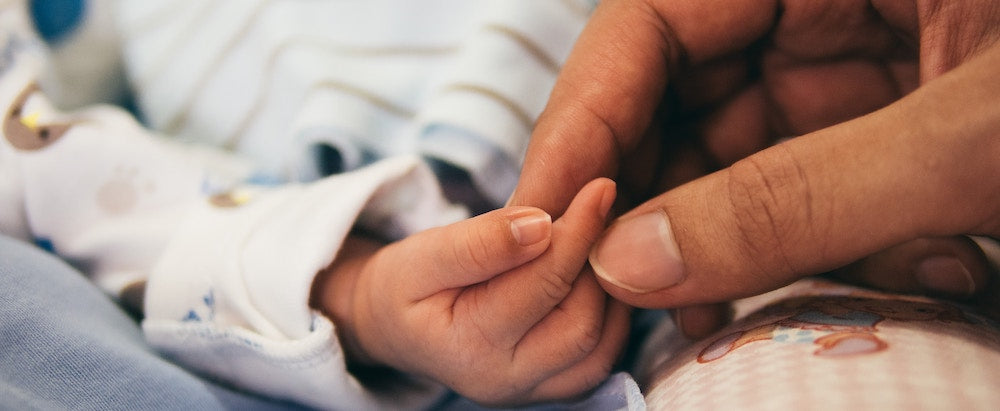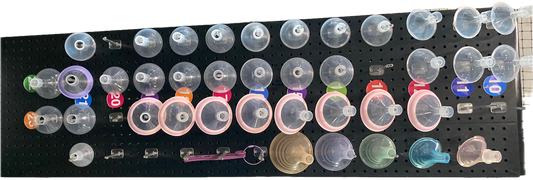
Regret in the broken heart of a "breastfeeding failure"
Share
Amanda didn’t plan for any of the traumatic stuff that happened to her.
There was no way to prepare for it. She planned on a natural birth without drugs. She planned to have her baby placed on her chest, and together they would begin breastfeeding, and have their “golden hour.”
Instead, she felt rushed and pressured during labor. She couldn’t get comfortable with a fetal monitor around her belly. It kept slipping, as she writhed on the bed, and giving false alarms. And, after 12 hours, the alarm was real, and baby Jade was born via c-section. Amanda and Jade were reunited a few hours later, and they started breastfeeding.
It was magical!
Jade knew what to do, and they did it together. They nursed and dozed, blissfully connected. Amanda had no pain. Jade was drinking first colostrum, then milk and making lots of diapers.
Five days later, Amanda's incision turned bright red and started oozing.
She went to her doctor who put her back to the hospital. She pumped as best she could, drifting in and out of drugs, and fever. Her husband, Rick, held the flanges and comforted her. Her mother fed the milk to Jade at home. She was there for a week.
Back at home again, Amanda tried to start breastfeeding again, and Jade refused to nurse. Amanda cried, both in pain from her incision, and the heartache of not breastfeeding. She held Jade skin-to-skin and tried to pump. She was not yet making enough milk.
Her first two months postpartum were painful and messy.
Every other day, a visiting nurse came to her home to check on her and to change her dressings. She encouraged Amanda to try to breastfeed, and taught her better pumping techniques. But, over the next few weeks, Jade was receiving more and more formula.
Amanda was spending nearly 3 hours a day plugged into the pump. Her mom was bottle feeding Jade. She was discouraged and angry. She cried because she missed her baby and one day decided to stop pumping. She got even angrier when her milk just “stopped” the next day. There was no swelling, no pain. She felt like her body had failed at everything it was supposed to be able to do naturally. It couldn’t birth, and it didn’t make milk.
She had slammed into an immovable object—an uncommon situation that is nearly insurmountable once it starts: a new mother with a life threatening illness or a complication from birth.
How could she have prevented this? Was there a way of reducing her risk?
There are always two paths, but there are no guarantees, because breastfeeding is unpredictable.
1. You can choose the path of education and advocating, and you are more likely to have a good outcome because you are empowered to make good choices.
2. You can choose the path of innocence and hoping, and probably will have a good outcome, but your health care providers will make all the decisions for you.
In Amanda's case, trouble started when her labor was restricted, and she was not able to move around. The false alarms scared her. These increased her risk of a c-section, which is how she gave birth.
If you are healthy and have no medical complications, using a midwife is the best option in having a natural birth, free of interventions. This generally leads into a good start to breastfeeding. Many childbirth interventions can delay or complicate breastfeeding.
If that is not an option, reducing risk with a childbirth class, a breastfeeding class, a birth doula and a breastfeeding plan always is. Using a pro-breastfeeding doctor, who trusts your birth process, is vital to mother and baby health.
It’s all about reducing risk and making peace with what happens.
In Amanda's case, her body’s reaction to the c-section started a chain reaction, that ended her breastfeeding. Some women hit one setback, others hit many in rapid fire succession. In the beginning, even one setback can feel overwhelming and cause you to quit.
Setbacks grind away at your resolve.
It’s easy to forget why you wanted to breastfeed, especially if you are isolated, or never breastfed before. Amanda stuck with it, until she couldn’t anymore.
When anyone doesn’t get what they want, they feel frustrated, sad, or even angry. Some people will quit as soon as the feelings become unbearable, others will keep searching for a way.
There is not one right way to move through problems. There is only your way.
It’s Ok to be angry and sad, but it’s not ok to hurt yourself, and beat yourself up.
Once you get through the crisis and get your strength back, it’s easy to look back and regret your decisions. You may feel depressed, angry at yourself, or even suicidal. It’s easy to think you are a bad mom for failing at breastfeeding. The data supports breastfeeding as the optimal way to feed your baby, but it’s not the only way for your baby to thrive!
You still have options. You may still be able to breastfeed again, at least a little bit, if you get help from a lactation consultant, or someone knowledgable.
A short term plan, taking it a day at a time, where you keep coming back and checking in with your original goal is always helpful. Baby-feeding combinations tailored for each family’s circumstances are often created by trial and error.
If you can’t, or don’t want to breastfeed, then make a plan for grieving.
Grieving is a marathon, not a sprint. Do a little every day by setting a timer, grieving and then putting it on hold until the next session. Therapy with the right therapist can help.
A lactation consultant who understands that you are done, can help you as well. Nobody breastfeeds forever and often women have strong feelings when the wean. It’s well within the scope of a lactation consultant to counsel you, when you end breastfeeding.
Social support can be tricky at this time.
The right kind of social support can be very helpful when you stop breastfeeding. Unfortunately, it’s hard to find the acceptance and the grace you need, when you are feeling so crappy about your choices.
You need empathy and compassion. You need a broadening of your knowledge of breastfeeding, and a bigger picture of feeding your baby. You don’t need affirmation when you still feel conflicted about whether you are doing the right thing!
In our lives, we have flowers and thorns.
Only some have perfect births. Only some have perfect breastfeeding experiences. Ultimately, we have to accept what we have been given or co-created, and make the best of it.
It’s the role of mothers to face these difficult choices for everything in our child’s lives. It’s not because you are a bad mother, it’s because you are a very good, and a very caring mother, that these choice are so painful.








